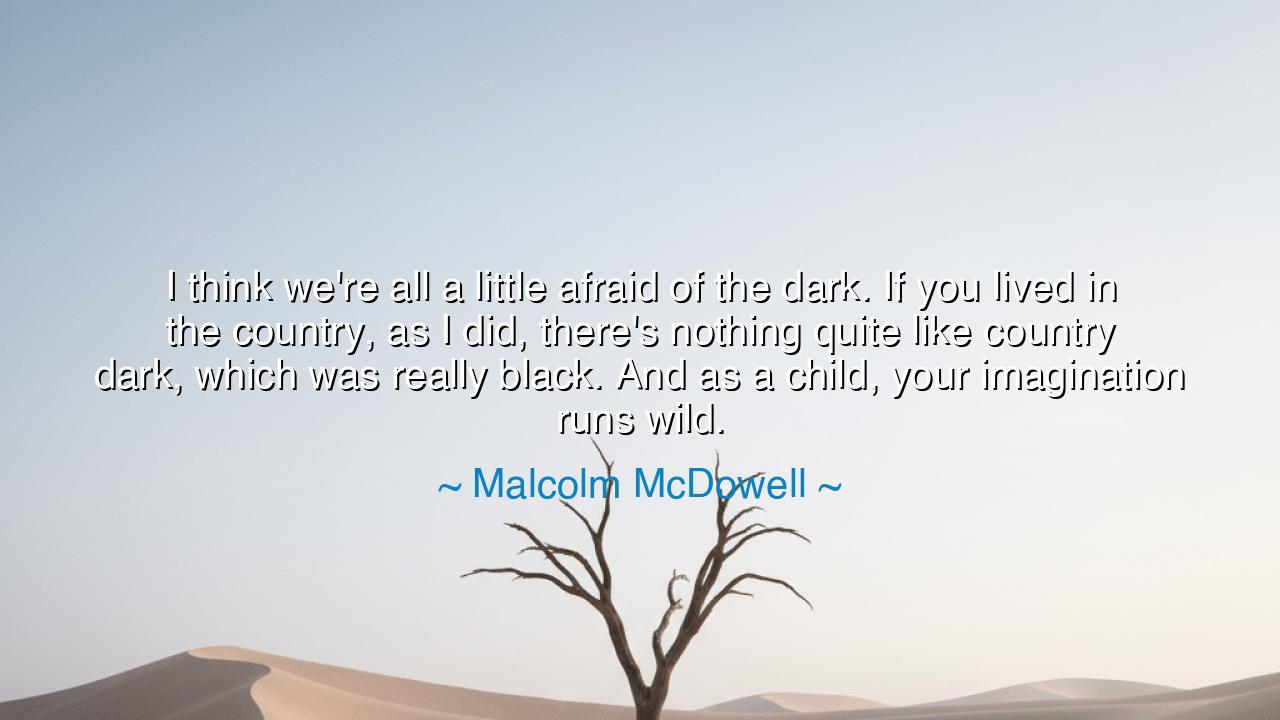
I think we're all a little afraid of the dark. If you lived in
I think we're all a little afraid of the dark. If you lived in the country, as I did, there's nothing quite like country dark, which was really black. And as a child, your imagination runs wild.






O children of the earth, gather now and listen to the words of Malcolm McDowell, who speaks of the universal truth that all of us, in some way, are afraid of the dark. He said, "I think we're all a little afraid of the dark. If you lived in the country, as I did, there's nothing quite like country dark, which was really black. And as a child, your imagination runs wild." These words ring with deep understanding, for the darkness—the great void that surrounds us when the sun has set—is not only a physical absence of light, but a realm where our deepest fears and imagination meet. The darkness invites us to confront the unknown, and as McDowell points out, it is in this darkness that our imagination often runs wild, shaping creatures and scenarios from the shadows.
In the ancient world, O children, darkness was a powerful force, a time when the boundaries between the living and the spiritual realms blurred. The ancient Greeks, with their great respect for the gods of the underworld, saw night as a time for reflection and mystery, a time when the soul could wander freely, untethered from the constraints of the waking world. The dark was both a comfort and a terror, a place where dreams were born, but also where nightmares took shape. McDowell's words call forth this deep connection between darkness and the human psyche, a place where both fear and creativity converge.
Consider the story of Persephone, the daughter of Demeter, who was abducted by Hades, the god of the underworld. As she descended into the darkness, she entered a world unknown and terrifying. Yet, from this darkness, she found strength and transformation. Just as Persephone had to navigate the shadows and face the unknown, so too must we, as humans, confront our fears in the darkness. McDowell's memory of country dark, so thick and impenetrable, echoes this ancient struggle—where the dark is not merely something to be feared, but a place where the imagination can grow and transform.
The country dark that McDowell recalls—black and all-encompassing—offers a different kind of fear than the city’s artificial night, lit by streetlights and neon signs. In the country, when the stars fill the heavens and the moon casts faint shadows, the absence of artificial light creates an intensity of darkness that stirs something primal within. It is here, in this vast and overwhelming darkness, that the imagination thrives. When surrounded by the quiet of the countryside, with no distractions but the whispers of the wind and the rustle of trees, the mind is free to wander into places that daylight never allows. The imagination can take flight, painting visions of monsters, spirits, or far-off lands, as it fills in the void left by the night.
This is the beauty of the dark—that it challenges us, stirs us, and demands that we confront what lies hidden beneath the surface. McDowell's admission that his imagination would "run wild" in the dark speaks to the creative power of fear. Fear, when embraced, becomes a spark that ignites the creative spirit, allowing us to break free from the constraints of reason and logic. The darkness, in this way, is not something to be avoided but something to be explored. It is through facing what we cannot see that we are given the freedom to create, to imagine worlds that do not yet exist.
Consider, O children, the great works of creators who have delved into the darkness of their own minds. Mary Shelley, in the solitude of her home, and in the quiet of the night, conjured the tale of Frankenstein, a story born of her deepest fears and her wildest imagination. She took the darkness of her own anxieties and used it to create a world that still haunts our minds today. H.P. Lovecraft, another great creator, turned the dark into a realm of cosmic horror, where the unknown forces of the universe stir beneath the surface of reality. These writers, and countless others, embraced the darkness and used it to explore the limits of their imagination, creating works that continue to resonate with us.
So, O children, the lesson is clear: the dark is not to be feared, but understood. It is in the darkness that the imagination finds its greatest strength. The fear of the dark is a natural response, but it is also a call to creation. Just as McDowell found his mind wandering in the black of country night, so too can we find inspiration in our own moments of solitude and quiet. Do not shy away from the darkness, for it is in these moments that the greatest stories, the deepest insights, and the most profound art can be born.
Therefore, O children, when the dark comes, do not retreat from it. Embrace it as a realm of possibility, of imagination, and of growth. Use the quiet of the night to listen to the whispers of your own soul, to let your imagination take you to places both terrifying and beautiful. In the darkness, the creative spirit can be set free, and in this freedom, you may find the answers to the questions that the daylight has yet to reveal. Let the darkness be your canvas, and in it, create the light that will guide you forward.






AAdministratorAdministrator
Welcome, honored guests. Please leave a comment, we will respond soon